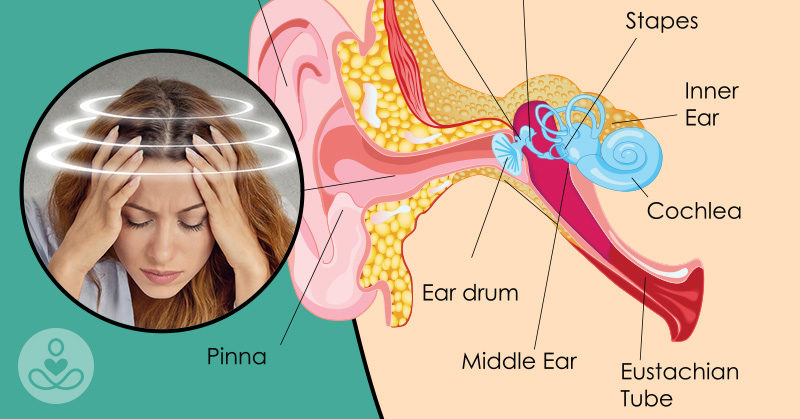Vertigo can be a debilitating condition that affects your balance and spatial orientation. It can make you feel as if you or the environment around you is spinning or moving when there’s actually no motion. While vertigo can be a temporary and isolated issue, it can also become a chronic problem if not properly addressed. This is everything you need to know about vertigo: What causes it, different types, common symptoms, and most importantly, seven effective ways to get rid of vertigo before it becomes a chronic problem.
Understanding Vertigo

Vertigo is a symptom rather than a condition itself. It is commonly caused by an underlying issue in the inner ear, such as BPPV (benign paroxysmal positional vertigo), Meniere’s disease, labyrinthitis, or vestibular neuritis. Other potential causes include head injuries, migraines, certain medications, and complications in the central nervous system. To effectively get rid of vertigo, it is important to identify and address the root cause. (1)
Different Types of Vertigo

Vertigo can be categorized based on its origin and symptoms. There are several types of vertigo, including peripheral vertigo, which is typically caused by inner ear problems, and central vertigo, which is usually connected to issues in the brain or central nervous system.
BPPV

BPPV is the most common type of vertigo. It is caused by a problem with the inner ear, which contains tiny crystals that help us maintain our balance. When these crystals become dislodged and move into one of the semicircular canals (which are responsible for detecting head movements), they can cause dizziness and other symptoms. The most common cause of BPPV is a buildup of calcium crystals in the inner ear. These crystals can become dislodged and move into one of the semicircular canals, where they cause dizziness and other symptoms. The exact reason why this happens is not known, but it may be related to aging or other factors that affect the balance system. (2)
Meniere’s Disease

Meniere’s disease is a disorder of the inner ear that causes episodes of vertigo, hearing loss, tinnitus (ringing in the ears), and a feeling of fullness in one or both ears. It is thought to be caused by an abnormal buildup of fluid in the inner ear, which can result from a number of factors, including infection, head injury, or allergies. The exact cause of Meniere’s disease is not known, but it may be related to aging or other factors that affect the balance system. (3)
Vestibular neuritis

Vestibular neuritis is an inflammation of the vestibular nerve, which connects the inner ear to the brain. It can cause sudden, severe vertigo and hearing loss in one ear. The exact cause of vestibular neuritis is not known, but it may be related to viral infection or other factors that affect the balance system. (4)
By understanding the type of vertigo one is experiencing, it becomes easier to develop treatment strategies that specifically target the underlying cause.
Read More: 10 Natural Remedies To Help Deal With a Sinus Infection
Common Vertigo Symptoms

Vertigo can manifest in various ways, and the severity and duration of symptoms can vary from person to person. Some common symptoms include dizziness, a spinning sensation, loss of balance, trouble focusing or moving the eyes, nausea, vomiting, and sweating. Being able to recognize these symptoms can help identify vertigo and seek prompt treatment.
7 Ways to Get Rid of Vertigo

As already mentioned, vertigo is not a lone condition but rather a symptom of another condition. You must address the condition that is causing your vertigo to truly break free from it. That being said, there are things you can do to help get rid of vertigo while you are in the process of treating its cause.
1. Epley Maneuver

This simple and effective technique involves performing a series of head movements to reposition crystals that may have become dislodged in the inner ear. The Epley Maneuver can help alleviate symptoms of BPPV and is best done under the guidance of a healthcare professional. (5)
2. Vestibular Rehabilitation Therapy

This specialized therapy aims to retrain the brain to compensate for balance problems caused by vertigo. It includes exercises and maneuvers that facilitate adaptation, improve coordination, and reduce dizziness.
3. Medications

Certain medications can help manage vertigo symptoms, specifically those caused by inflammation or inner ear infections. These medications may include antihistamines, anti-nausea drugs, or steroids. It is important to consult with a healthcare professional before starting any medication.
4. Dietary changes

Some dietary modifications can alleviate vertigo symptoms. Reducing salt intake, avoiding trigger foods like caffeine and alcohol, and maintaining adequate hydration can all contribute to better management of vertigo. (6)
5. Stress management

Stress and anxiety can exacerbate vertigo symptoms. Engaging in stress-reducing activities like yoga, meditation, and deep breathing exercises can be beneficial in preventing the onset or severity of vertigo. (7)
6. Ginger

Known for its anti-inflammatory and anti-nausea properties, ginger can help reduce dizziness and nausea associated with vertigo. It can be consumed in various forms, such as ginger tea, ginger candies, or ginger capsules. (8)
7. Alternative therapies

Some individuals find relief from vertigo through alternative therapies such as acupuncture, chiropractic adjustments, or herbal supplements. While the efficacy of these therapies may vary, they are worth exploring under the guidance of a qualified practitioner.
Tips for Managing Symptoms Until Vertigo Goes Away

While addressing the underlying cause of vertigo is crucial, it is equally important to manage the symptoms during this time. Some tips for managing vertigo symptoms include:
- Taking frequent breaks and resting when needed
- Avoiding sudden head movements or positions that trigger dizziness
- Using assistive devices, such as canes or walking sticks, to improve stability
- Creating a safe environment by removing hazards and ensuring good lighting
Read More: 7 symptoms of B12 deficiency that you should never ignore
How Long Does Vertigo Last?

The duration of vertigo can vary depending on the underlying cause and individual factors. In some cases, vertigo may go away on its own after a few hours or days. However, in other cases, it may persist for weeks or even become a chronic problem. Identifying the cause of vertigo and seeking proper treatment can significantly reduce its duration and prevent it from becoming a long-term issue.
When to See Your Doctor

It is recommended to seek medical attention if vertigo symptoms persist, worsen, or interfere with daily activities. Additionally, consult a healthcare professional if vertigo is accompanied by severe headaches, hearing loss, vision changes, or other concerning symptoms. Early intervention can help prevent the development of chronic vertigo and promote a faster recovery.
The Bottom Line

By understanding what vertigo is, its causes, types, and common symptoms, individuals can take proactive steps to address vertigo before it becomes a chronic problem. The seven effective ways discussed in this article, along with proper medical guidance, can help alleviate symptoms and improve the quality of life for those experiencing vertigo. Remember, always consult with a healthcare professional for personalized advice and treatment options tailored to your specific situation.
Read More: 6 Signs Your Vitamin B6 Levels Are Low
Sources
- “Vertigo.” Penn Medicine
- “Benign paroxysmal positional vertigo (BPPV).” Better Health
- “Meniere Disease.” Hopkins Medicine
- “Vestibular Neuronitis.” NCBI. Travis Smith, Justin Rider,Steven Cen and Judith Borger. July 21, 2023.
- “Epley Maneuver (Canalith Repositioning) for Benign Positional Vertigo” Wiley. Tareq Azad MD, Gina Pan MD,and Rajesh Verma MD. April 13, 2020.
- “Is Inadequate Water Intake a Risk Factor for Vestibular Disorders?.” Advancedotology. May 2022.
- “Stress & Vertigo: Is There A Connection?” San Diego Chiro Neuro. October 23, 2023
- “Clinical observation on ginger-partitioned moxibustion plus manual repositioning for benign paroxysmal positional vertigo (BPPV).” Springer. February 2016.

